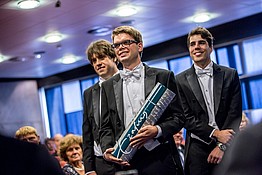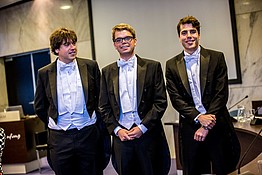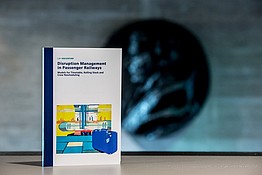PhD Defence: Disruption Management in Passenger Railways - Models for Timetable, Rolling Stock and Crew Rescheduling

ERIM’s Luuk Veelenturf confronts the inevitability of disruptions in railway planning in his PhD ‘Disruption Management in Passenger Railways’ and explains how models can be used to induce flexibility into scheduling, such as through consideration of small delays during planning. Though Luuk acknowledges that these models present no panacea for difficulties faced in railway planning, they do present interesting insights into how small issues can be mitigated before they become significant through ingrained flexibility.
Luuk defended his dissertation in the Senate Hall at Erasmus University Rotterdam on Friday, 21 November 2014. His supervisor was Professor Leo Kroon and his co-supervisor was Dr. Gabor Maroti. Other members of the Doctoral Committee included Dr. Dennis Huisman (ERIM), Professor Paolo Toth (Università di Bologna) and Professor Rob Zuidwijk (ERIM).
About Luuk Veelenturf

Lucas Veelenturf was born July 22nd 1987 in Woerden, the Netherlands. In 2005 he graduated from high school at Minkema College Woerden. For his Bachelor and Master of Science education Luuk studied Econometrics and Management Science at Erasmus School of Economics, Erasmus University Rotterdam. During his study he applied research at Netherlands Railways for both his Bachelor and Master of Science thesis. After graduating from his Master's degree in 2009, he started his PhD research in railway disruption management at Rotterdam School of Management, Erasmus University. He also spent three months at University of Bologna in close research collaboration with Professor Paolo Toth. The research undertaken during his PhD led to several awards and publications.
At the moment of writing Luuk has two published papers in Transportation Research Part B: Methodological and Transportation Research Part C: Emerging Technologies, and one accepted paper in Transportation Science. Furthermore, two papers are in the review process. At the INFORMS Annual Meetings of 2012 and 2013 he became second and third in the Student Paper Award competition of the Railway Application Section of INFORMS. He also got granted the Junior of the Year Award from the Research School TRAIL in 2010.
Next to research Luuk has a strong affiliation with teaching. He got his first teaching experience as a teaching assistant for Mathematics and Linear Algebra during his study at the Erasmus School of Economics. As a PhD student at Rotterdam School of Management, Luuk enjoys a lot of teaching activities (especially for the Mathematics course).
As of September 2014, Lucas is as an Assistant Professor at the School of Industrial Engineering at the Eindhoven University of Technology.
Thesis Abstract

Every day a significant number of people choose the railways as a comfortable and sustainable way of transportation. In order to accommodate the journeys of a large number of railway passengers, extensive planning is necessary. Unfortunately, the execution of the plans is frequently disrupted by unexpected events. For railway operators it is quite a challenge to deal with these disruptions as even small deviations from the plan can have large influences on the timetable, the rolling stock schedule and the crew schedule. More severely, these events reduce the available transport capacity and interrupt the mobility of the passengers.
This thesis discusses several models and solution approaches for railway disruption management based on algorithmic techniques from Operations Research. The main focus is to reduce the inconvenience passengers experience during disruptions. This is achieved by improving the disruption management approaches for timetable, rolling stock and crew rescheduling proposed within the scientific community. The existing models are extended by introducing greater flexibility, e.g. allowing small delays in the crew rescheduling or addition stops in the rolling stock rescheduling. As a result fewer trains are cancelled during disruptions and passengers have more options to reach their destination. Although some inconvenience will remain, as much as possible is mitigated.
Photos: Chris Gorzeman / Capital Images


